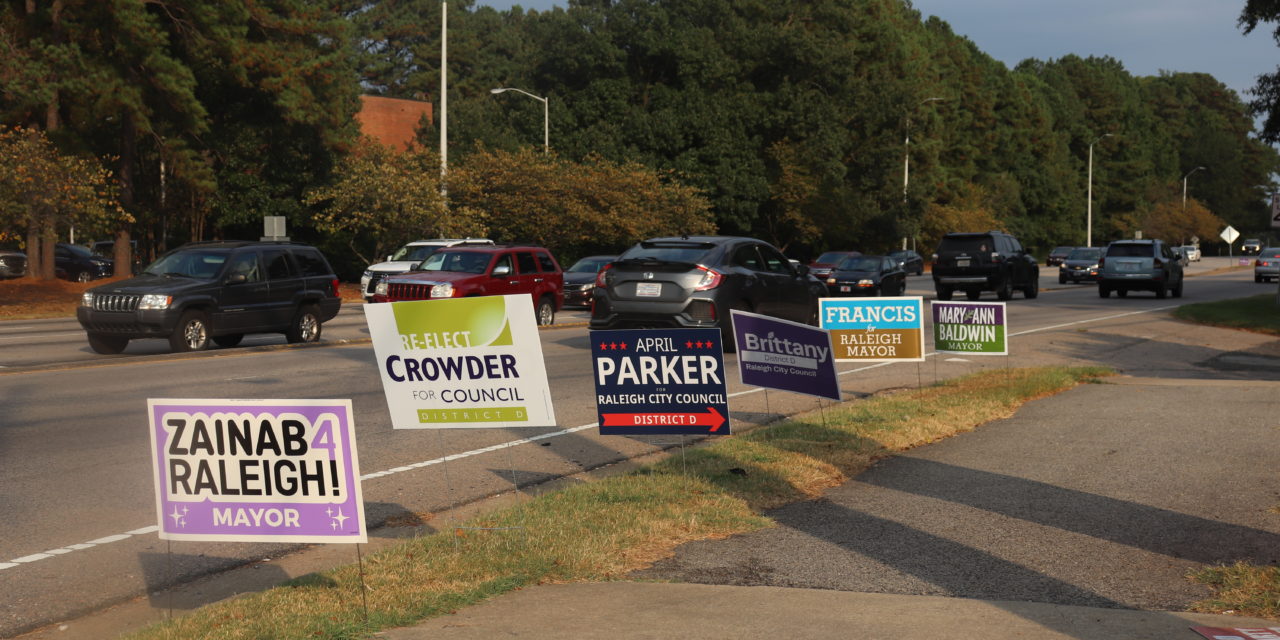Kevin Moye | Managing Editor
Last Tuesday, Oct. 8, municipal elections were held in Raleigh with city council spots and the mayor’s seat up for grabs. The election cycle resulted in a progressive wave with representatives of this side of the left winning key positions.
With the incumbent mayor, Nancy MacFarlane, choosing not to run the race for her position was wide open. Six challengers ran to occupy the newly opened position: Mary-Ann Baldwin, Charles Francis, Caroline, Sullivan, Zainab Baloch, Justin L. Sutton, and George Knott.
Baldwin and Francis secured the lion’s share of votes in the election with them receiving 38 percent and 31 percent of the votes, respectively. Sullivan followed them with her receiving 20 percent of the vote while Baloch, Sutton and Knott ended their nights in the single-digits.
On Friday, Oct. 11, it was declared that Baldwin would be the next mayor of Raleigh as Francis declined to pursue challenging her again in a November run-off election. The race would have been a familiar scene for Francis as it would have marked the second-straight mayoral race for him to end in a run-off.
Raleigh law mandates that a candidate must win by a majority vote to have an outright winner. An election where neither candidate exceeds the 50 percent threshold has the option go to a run-off election where a simple plurality will then suffice.
The former City Council member, Baldwin, has already identified some of the issues she will be prioritizing in her time as mayor. She has cited Raleigh’s housing crisis, public transit and job creations as the most pressing matters she will face.
Baldwin credited her victory to the grassroot movement her campaign was able to create through connecting to voters.
“I went around this city talking to lots of people about my experience on the city council,” Baldwin stated. “I talked to them about the issues that I felt passionate about and that I took action on.”
The elections also brought a historic outcome in regards to the city council. For the first time ever, Raleigh will get its first LGBTQ City Council members. Saige Martin and Jonathan Melton, two openly gay challengers won their races against incumbent City Council members.
The twenty-eight-year-old, Martin, will be representing District D. The race for District D saw three challengers, Brittany Bryan, Saige Martin and April Parker, attempt to dethrone the incumbent, Kay Crowder. Martin secured the largest share of votes at 47 percent, while Kay Crowder ended the night with 33 percent of the votes.
Martin embarked on his campaign with a host of left-wing policies. He has placed “housing as a right” and the need for the creation of a long-term renewable energy plan in Raleigh as key policies he will pursue as a City Council member.
Like the mayoral race, voters would have gotten the chance to choose between Martin and Crowder in the November run-off election. However, Crowder opted out of entering the race in a concession post on Facebook.
“I thank all of the residents of Raleigh’s District D for the great honor and privilege of serving as your city councilor,” Crowder said. “It has been exciting to be a part of the wonderful changes that have made this city the best in the country. I wish Mr. Martin all the best as he works to keep District D a wonderful place to live, work and play.”
Fellow elected LGBTQ Council Member, Jonathan Melton joined Martin in making Raleigh history by dethroning the incumbent, Russ Stephenson. Melton ran for the at-large Council position meaning that he will represent each district of Raleigh. The new Council Member campaigned on a message of developing Raleigh while still attending to the needs of those often left behind by growth projects.
Nicole Stewart, the second incumbent for the at-large City Council position held on to her spot by a dominant margin. Stewart garnered 33.7 percent of the at-large votes — a 10 percent higher margin than her elected counterpart, Melton.
With the election of its first two LGTBQ City Council members and a host of progressive leadership, Raleigh can expect to continue and expand upon its path of liberal policy-making.


